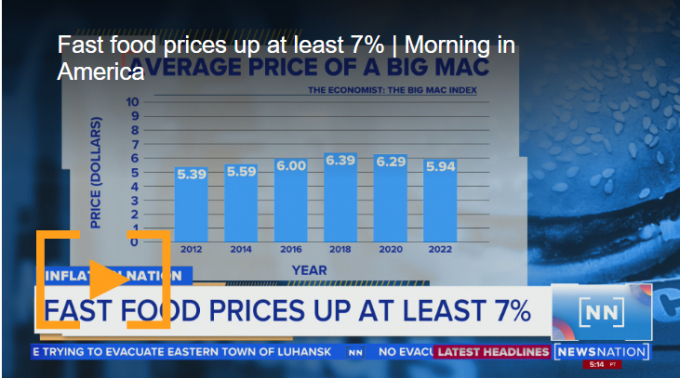November 27, 2025 | 23:36 GMT +7
November 27, 2025 | 23:36 GMT +7
Hotline: 0913.378.918
November 27, 2025 | 23:36 GMT +7
Hotline: 0913.378.918

The price of the popular McDonald’s burger rose 7% last year. In the past 10 years, the price of the Big Mac jumped 40%. Source: Newsnationnow
Going to the grocery store has been a little harder on your wallet lately. The Department of Agriculture recently released a report that said that practically all food - from restaurants and grocery stores - is getting more expensive.
From Oreos to ground beef, everything at the grocery store is getting more pricey. The USDA’s new report said that grocery store food prices were 8.6 percent higher in February of this year than they were in February of 2021. That’s the largest 12-month advance since 1981.
The department cited the war in Ukraine as a factor for these price jumps, especially since Ukraine is a major wheat producer. Leo Feller, Senior Economist at the UCLA Anderson Forecast, a leading economic forecasting organization, explains more about how the Russia-Ukraine conflict is contributing to this issue.
LEO FELER: Russia is a major producer of fertilizer, which is involved in food production. Ukraine is a major producer of wheat. Without Russian fertilizer and without Ukrainian wheat production, that puts upward pressure on prices in general and so we saw that big rise in food prices here in the US, as well. It’s all connected, right? We live in a global market.
Feler also put these increases in the context of the price hikes we saw in 2020 during the start of the COVID-19 pandemic, which he said drastically changed the types of products Americans were spending their money on.
FELER: Some of this is still a little bit pandemic related - our consumption patterns still are different than they were before the pandemic and our production hasn’t caught up to these different kinds of consumption patterns. Early on in the pandemic, comfort foods like Oreo cookies and ice cream were more expensive when we were all staying at home and watching TV.
In fact, fluctuation in food prices is not uncommon, especially during times of larger scale inflation.
FELER: Food tends to be very volatile - it goes up and then it goes down. But without a doubt, we are seeing more broad based inflation, including more food items at this point in time.
While the pricey receipts are a cause for concern, Feler is not too concerned about them in the bigger picture of the country’s economy.
FELER: The inflation we’re seeing right now is about food and energy. And if you take out food and energy, we’re actually seeing the rate of inflation slow down. It’s still high but it’s not as high as it was in October, November, December, January and February.
The Department of Agriculture said they will continue to monitor food prices closely to see how global events, like the pandemic and the war in Ukraine, will impact the affordability of food.
Fast food prices up at least 7%
Rising prices have now hit the fast food industry. Fast food menu prices are up more than 7% between March 2021 and March 2022, according to the National Restaurant Association.
The hike is the largest 12-month increase since 1981. Experts attribute the increased menu prices to higher input costs – particularly food and labor.
According to the Big Mac Index, the price of the popular McDonald’s burger rose 7% last year. In the past 10 years, the price of the Big Mac jumped 40%.
Studies show the most expensive places to buy a Big Mac are in cities that have a higher minimum wage. For example, the minimum wage in Austin, Texas is $7.25 and the cost of the burger is about $3.75 there. In San Francisco where minimum wage is $16 and the burger costs $5.79. The highest price for the famed burger is in Seattle at about $6.39, where the minimum wage is just over $17.
Experts say the Big Mac price hikes are outpacing inflation and the cost of living in some areas.
(Uscannenbergmedia)

(VAN) A new study reveals how the simultaneous effects of ocean acidification, salinity and loss of oxygen are making the world more fragile.

(VAN) Hopes are growing that the creation of the first 3D turkey gut model could be a turning point in the battle against the virulent blackhead disease.

(VAN) Tyson, America’s biggest meat supplier, plans to shutter one of its largest beef processing plants as the industry continues to struggle with low cattle supplies and political pressure from Washington.

(VAN) New FAO study shows how digital solutions are empowering farmers and fishers to prevent losses and build resilient agrifood systems.

(VAN) Brazil's COP30 presidency pushed through a compromise climate deal on Saturday that would boost finance for poor nations coping with global warming but that omitted any mention of the fossil fuels driving it.

(VAN) Poultry farmers in the UK have been warned that they could face one of the worst winters yet for bird flu.

(VAN) Prices of main-crop paddy have risen sharply, with jasmine rice hitting 16,100 baht per tonne — the highest level in years.